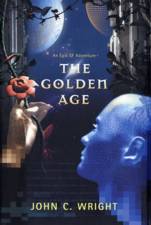

| Click on a book's image or title to order from Amazon.com |

The Golden Age
Tor, HC, © 2002, 336 pp, ISBN #0-312-84870-6Reviewed January 2004
The Golden Age, subtitled "A Romance of the Far Future", is a high-tech SF novel about humans living in the vicinity of the technological singularity, featuring extensive virtual reality, immortality, and memory editing. Warning: It is not a complete story. Tor apparently decided to chop the novel up into several books, so The Golden Age ends rather abruptly - an unfortunate decision, as the book is not very long. The conclusion is entitled The Phoenix Exultant.
The protagonist is Phaethon, son of Helion, who awakes to find that he is missing many of his memories from the past 250 years. This is during the High Transcendence, a millennial event which will determine the direction of human culture for the next thousand years. While Helion and his fellow Peers - the richest humans alive - negotiate the nature of the Transcendence, Phaethon has an encounter with a Neptunian, a society outside of the utopian Golden Oecumene centered around Earth, who urges him to leave for the outer solar system with him.
Phaethon's investigations reveal that he has committed or threatened to commit an act so heinous to the mind of the population of the Oecumene that the two sides could only come to an agreement by Phaethon voluntarily erasing his memories of all events surrounding the act. (The Oecumene seems to abide by Libertarian principles of non-interference with the individual and so could not compel him to desist.) His memories are stored in a "box" in the master computer of his social order, but if he chooses to open them then he will be exiled by the terms of the agreement. However, other clues suggest that Phaethon can win all of his goals - whatever they are - by waiting until after the Transcendence and then regaining his memories.
This is a tremendous challenge for Phaethon, who loves truth above all else, particularly when some surprises regarding his wife Daphne and other individuals around the Oecumene become evident.
I will confess here that I almost never abandon a book in the middle, since I always hold out hope that the book will improve once I know all and that it will have ultimately have been worthwhile. I was down on The Golden Age mid-way through, as it was plodding and tedious, without any compelling characters. Wright's style is that overly-descriptive sort which often has trouble coming to the point, and I saw little hope that I would have any interest in reading the second part of the story.
To my surprise, near the end of the book I found the story engaging enough despite these flaws to genuinely want to know what happens next! What changed my mind is that the book's themes finally kicked in, and made Phaethon a sympathetic enough character that I cared about the issues at stake. It's still a somewhat abstract book, but thought-provoking.
Rather than extolling the virtues of a Libertarian society (which would have been a big yawn-fest, and a simple criticism of one not much better), the Oecumenical society is used instead as a backdrop for Phaethon's beliefs about the future of humanity, and his endless quest of truth, and what he has to sacrifice for that truth. Made aware of what the truth will cost him, he works at the edges of the truth to find out what it encompasses. This is no mean feat in a world where everyone's memories can be edited, by themselves or (at their consent) others. Throw in the fact that much interaction occurs in cyberspace with different sorts of perceptions, and even the certainty of what the truth is is somewhat shaky. Phaethon can only rely on his own extraordinary sense of self and self-certainty.
The book also concerns the course of human civilization, and what one man can do to change its course even when all of society is set against him. The Golden Age only hints at the full ramifications of this struggle, which will presumably be enlarged upon in the conclusion.
Still, the book's flaws as I previously mentioned them stand: By-and-large the characters are not very compelling, and the dialogue is largely dry, with a few humorous moments sticking out like a sore thumb (often provided by the artificial intelligences which litter the landscape). The story is not dynamic by any means - action is rare. Fortunately, The Golden Age avoids the most ridiculous excesses of Tony Daniel's disappointing Metaplanetary, though it feels not quite as strong as Donald Kingsbury's Psychohistorical Crisis (with which it shares some key elements, particularly memory loss).
So the book is certainly not for everyone - one really has to relish the workings of extremely high tech to make much headway. But it did end up being engaging enough for me to want to read the conclusion, and that counts for a lot.
hits since 18 January 2004.